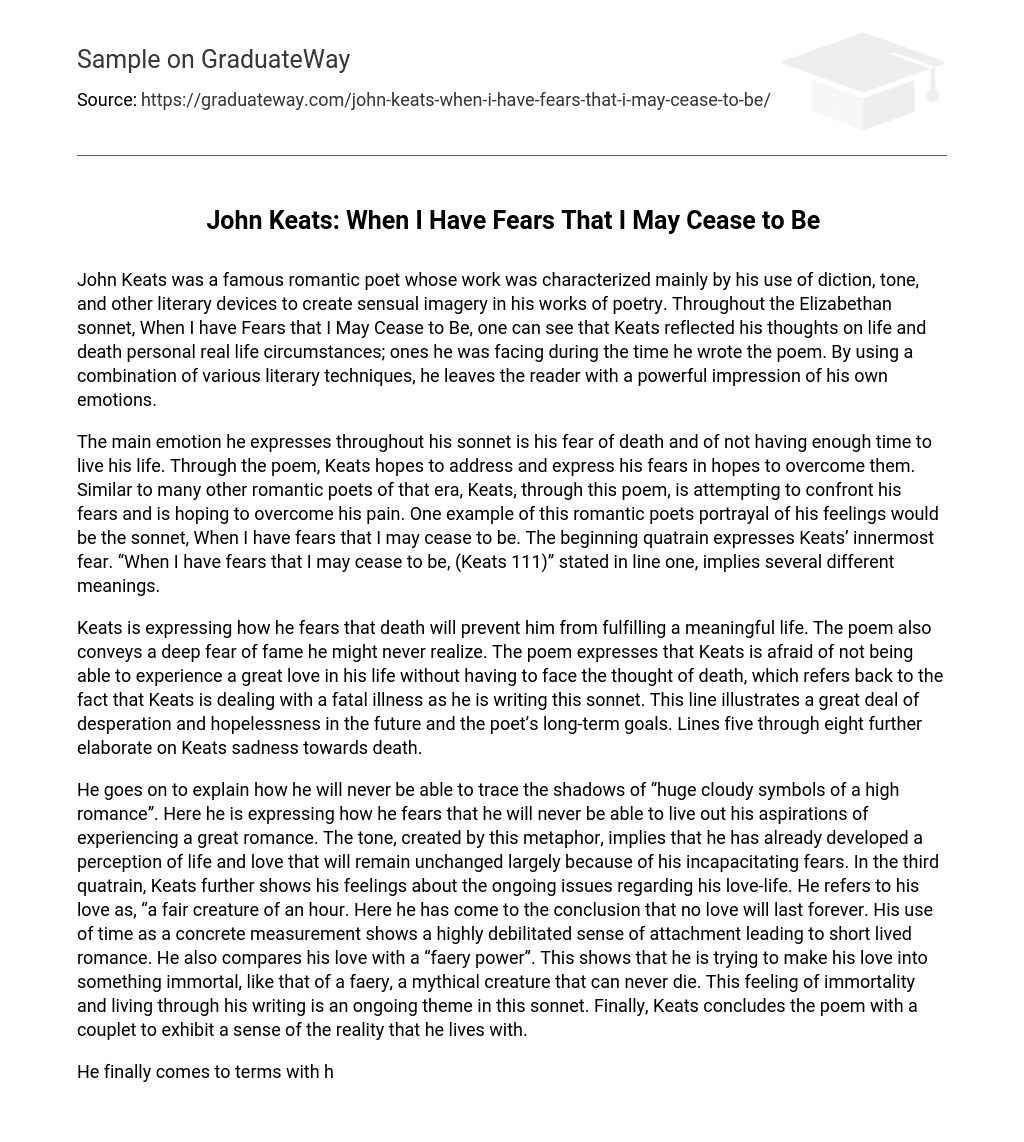John Keats was a famous romantic poet whose work was characterized mainly by his use of diction, tone, and other literary devices to create sensual imagery in his works of poetry. Throughout the Elizabethan sonnet, When I have Fears that I May Cease to Be, one can see that Keats reflected his thoughts on life and death personal real life circumstances; ones he was facing during the time he wrote the poem. By using a combination of various literary techniques, he leaves the reader with a powerful impression of his own emotions.
The main emotion he expresses throughout his sonnet is his fear of death and of not having enough time to live his life. Through the poem, Keats hopes to address and express his fears in hopes to overcome them. Similar to many other romantic poets of that era, Keats, through this poem, is attempting to confront his fears and is hoping to overcome his pain. One example of this romantic poets portrayal of his feelings would be the sonnet, When I have fears that I may cease to be. The beginning quatrain expresses Keats’ innermost fear. “When I have fears that I may cease to be, (Keats 111)” stated in line one, implies several different meanings.
Keats is expressing how he fears that death will prevent him from fulfilling a meaningful life. The poem also conveys a deep fear of fame he might never realize. The poem expresses that Keats is afraid of not being able to experience a great love in his life without having to face the thought of death, which refers back to the fact that Keats is dealing with a fatal illness as he is writing this sonnet. This line illustrates a great deal of desperation and hopelessness in the future and the poet’s long-term goals. Lines five through eight further elaborate on Keats sadness towards death.
He goes on to explain how he will never be able to trace the shadows of “huge cloudy symbols of a high romance”. Here he is expressing how he fears that he will never be able to live out his aspirations of experiencing a great romance. The tone, created by this metaphor, implies that he has already developed a perception of life and love that will remain unchanged largely because of his incapacitating fears. In the third quatrain, Keats further shows his feelings about the ongoing issues regarding his love-life. He refers to his love as, “a fair creature of an hour. Here he has come to the conclusion that no love will last forever. His use of time as a concrete measurement shows a highly debilitated sense of attachment leading to short lived romance. He also compares his love with a “faery power”. This shows that he is trying to make his love into something immortal, like that of a faery, a mythical creature that can never die. This feeling of immortality and living through his writing is an ongoing theme in this sonnet. Finally, Keats concludes the poem with a couplet to exhibit a sense of the reality that he lives with.
He finally comes to terms with his fears in these last two lines and realizes that life does not last forever. He confesses that the two things that he is most passionate about in his life, “love and fame,” are finite. “Till love and fame to nothingness do sink,” expresses Keats’ new feelings about death and how he sees love and fame as insignificant sensations compared to life itself. He has come to the realization by the end of this couplet that love and fame are materialistic and that living a full life is what is more important.
It is in these last two lines where Keats expresses his underlying weakness, which before, the reader believed to be his fear of death. The real fear he faces, it seems, is not death, rather fear of himself; that he does not know what the meaning of his own existence is. Throughout the sonnet, Keats battles with not having enough time to reach fame or experience true romance, however, the final shows that he has realized that these two concepts are unimportant because they will eventually “cease to be”. Even the title of the poem expresses how Keats fears that his works of poetry will not allow him to live forever.
Works Cited
Keats, John. “When I Have Fears That I May Cease to Be. ” Ed. Phillis Levin. The Penguin Book of the Sonnet: 500 Years of a Classic Tradition in English. New York: Penguin, 2001. 111. Print. “Keats: When I Have Fears That I May Cease to Be”” When I Have Fears That I May Cease to Be. 12 Feb. 2009. Web. 13 Oct. 2010. .





